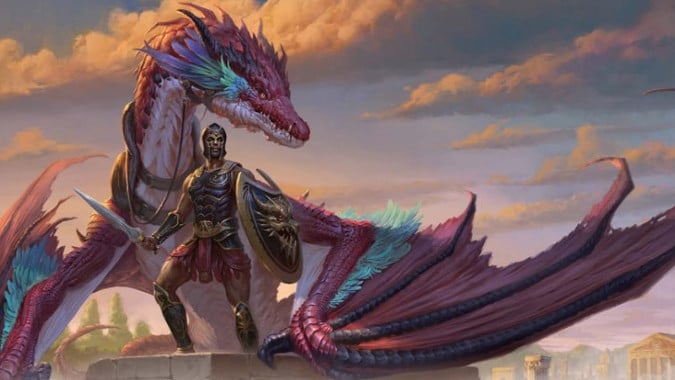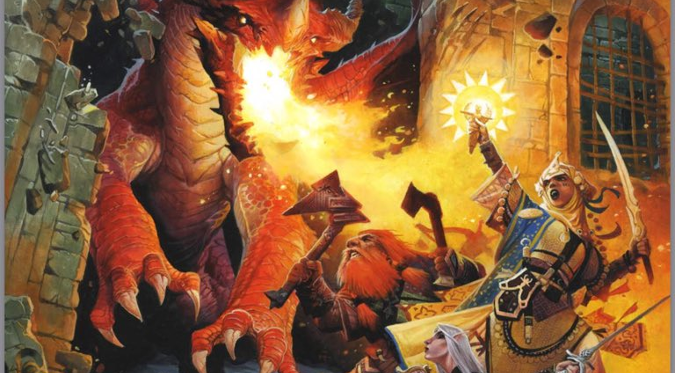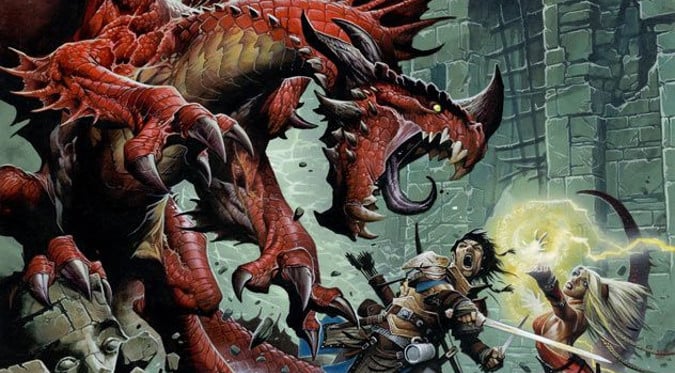How to get your party back on track as a DM

Every Dungeons and Dragons Dungeon Master has been there. Our party has fallen into dismay — perhaps arguing about what to do next, or maybe as a hypothetical example I just came up with, a Kenku Bard and a Water Genasi Sorcerer are at odds about killing a surrendering NPC and want to fight it out. Whatever the case, there’s all sorts of tension, or the storyline is completely off the rails and you don’t know what to do.
Relax. Take a deep breath. Herein are some options for dealing with a party of adventurers who have seemingly abandoned all hope of getting anywhere. Sometimes, you can redirect them and sometimes you can just see where they end up taking you.

Let’s see where this goes
One way to deal with a party who, to use one example, decides they don’t want to go to the place you’ve spent six sessions preparing for them to go and instead want to head off to a city on the opposite side of the continent because a throwaway NPC you put in just for flavor is from there and they all love the character so much they want to see the place they’re from. You were intending to do a whole bunch of courtly intrigue and now they’ve turned it into a road movie and you were completely unprepared. You’re desperately trying to come up with a way to fix this.
My advice to you is don’t try.
All that work you did on the court? Stow it for a while. Let it rest. Spend a few minutes coming up with some random encounters on the road, make up or recycle some small towns (note — all you have to do is change the names and you can use that village from the intro session as a completely serviceable new town, they’ll never know the difference) and see what they end up doing. Let the players control where the narrative goes and see where they end up. Prepare some loose notes — maybe on their way to Eisenfall, the city they’re heading to, you can plot in a bandit stronghold bedeviling the small town of Padanshire, and another adventure to the Lost Swamp of the Mirrorfae on the way, so that by the time they reach Eisenfall they’ve made a bit of a reputation.
Then dust off that courtly intrigue idea and use it here instead. It’s not like they know you’ve changed it from Ballatyre to Eisenfall — they never actually saw any of that stuff, remember? You can wholesale import the NPC’s, or change them around, however makes it easier for you, and the players will be thrilled they got to do some exploring.

Narrative Judo
Your players are dithering about going off to face the evil undead scourge you have attacking the whole world. They keep wanting to do other things. You’re wracking your brain trying to figure out how to get them interested in this undead threat, and then you remember that one of your players has this whole backstory about being a young Prince who joined the Paladins to please his father and a demanding mentor who is one of the first and most important Paladins in the world.
So you have that older Paladin show up and make the player’s whole backstory work for you. You have the undead threaten his homeland, and even work in an old flame from their youth as a companion character so that this player now has a stake in what’s going down outside the undead are bad. Sure they are, but now it’s personal — it’s that player’s people who are on the chopping block.
This is one of the ways that player backstories can be fleshed out. If your players have even the thinnest possible justification to be personally invested in a storyline, use it. The party bard doesn’t really want to go to the frozen north, but he set up a rivalry with a fellow graduate from the infamous Solheart Bardic Collegium? Well, turns out Alwynna the Radiant, Bard Extraordinare, is not only going north but she writes a Bardic satire (basically a fantasy version of a diss track) about how that player simply can’t handle the danger. Your Wizard wants a rare magical item that will help her control time? It’s up north too.
Remember, all that backstory exists for you to make use of it. Get them personally involved in these world shaking events.

Above all, don’t panic
If the group is really stymied by these kinds of conflicts, never let yourself become part of it. If one player wants to murder a surrendering Kobold and another is wholly opposed? That’s them, that’s not you. Play as fair as you can. Also, play the responses of everyone who isn’t a player — if the surrendering NPC sees that they’re distracted fighting among themselves, let that NPC try and make a break for it while they’re squabbling. If there’s an old Paladin mentor nearby, he certainly can object to the idea of purging an entire city. That doesn’t mean that you should force the players not to do it, any more than you should ever force them to do anything — you let them make their character decisions and then you adjudicate the result and the repercussions.
So if your players get into an argument about killing a guy, even start casting spells at each other, and the guy escapes? Deal with what that leaves the party with. Same if the party member who wants to kill that guy pulls it off — deal with the consequences and use them to lead you into the next story beat. It’s not about the story you alone want to tell, it’s about they story everyone at the table ends up telling. It’s a group game, and group initiative in this variety is to be encouraged. You can always bring your idea back, perhaps changed to fit the new circumstances, but getting the players to take these steps? That’s rare. Cherish it.
Video game RPGs often have to be on rails. You’re a living, breathing DM. You don’t have that limitation.
Please consider supporting our Patreon!
Join the Discussion
Blizzard Watch is a safe space for all readers. By leaving comments on this site you agree to follow our commenting and community guidelines.
 @MatthewWRossi
@MatthewWRossi




